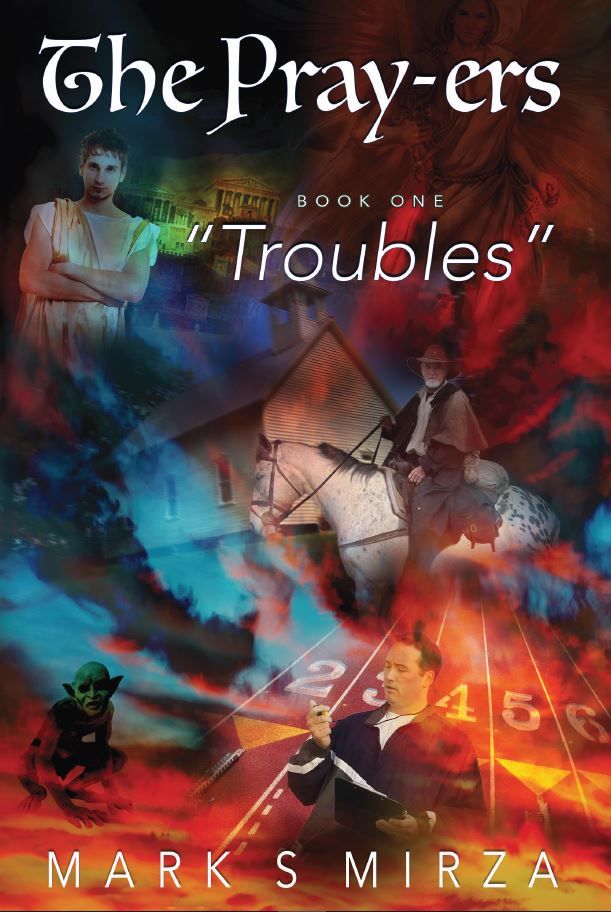
I had the opportunity to read Mark S. Mirza's novel The Prayers / Book 1 Troubles during the last few weeks. This book was published by CTM Publishing Atlanta.
In the very beginning of the book, the author takes a few pages to discuss some very specific things about this piece of fiction. Specifically he writes:
As I write this book the desired outcome is very specific and very simple. First, admittedly, I want you to learn prayer. i don't just want you to learn ABOUT prayer, but I want to hear of prayer becoming who you are, how you breathe Christianity, if you will. So to reach that aim you will see much repetition by various characters in various situations, but handling the problems the same way. Secondly, and this is very important to me: I want you to enjoy yourself.
This paragraph nearly perfectly summarizes my experience while reading Mirza's novel.
A quick overview: this is a book a little bit like the This Present Darkness series that emerged when I was a teenager. It follows the lives of people in Biblical times, early 19th century times, and modern day times as they experience life and learn how to pray and navigate through it. I found that this book was educating me in a way I was not expecting. I was thinking about prayer a lot while reading this book. It was like watching the movie War Room. You left the theater inspired to make a change in your life.
This book did that for me.
And now some notes:
Firstly, Mirza is a good writer. Since I am a grammar teacher by trade, and have worked as a writer and an editor in various fashions, I am very aware of how writing is flowing. I am looking for errors, and I catch them regularly. There were a few grammatical errors in Mirza's book and instances where the punctuation was laid out a bit awkwardly, but generally speaking, it is a clean book and Mirza handles the English language very well. I think this is important because even the best stories, if written poorly, will not be a good read.
 Secondly, Mirza's main goal came through. I found myself, as I was reading, truly coming to learn about prayer. I wanted to pray for more. I wanted to view the world the way the heroes in this story were seeing it: through a spiritual lens. The story worked for me and while not the best piece of fiction I have ever read, I am not recalling a time I read fiction and felt myself getting a self-help book at the same time.
Secondly, Mirza's main goal came through. I found myself, as I was reading, truly coming to learn about prayer. I wanted to pray for more. I wanted to view the world the way the heroes in this story were seeing it: through a spiritual lens. The story worked for me and while not the best piece of fiction I have ever read, I am not recalling a time I read fiction and felt myself getting a self-help book at the same time.
(Sidenote: I am not a fan of self-help books whether they be for me or for my parenting or for my marriage. I just can't get into them and often fall asleep while reading them. And that's what I loved about this book. I was learning while enjoying. A brilliant combination!)
Because his goal was not just telling a story, he included some things (like footnotes) not common to a piece of fiction. However, even though they could make the book a little bit more like a textbook, I found they were very important to the story. As I read about a certain type of prayer or about a Biblical reference, it was noted in the footnotes. This was very encouraging to me. I often grabbed my Bible to read about a scripture reference to prayer that I was unable to recall. I truly liked this aspect of the work.
One thing that Mirza did not do that I thought would bother me tremendously was something that he also mentioned in the preface. He decided not to capitalize any names of any people related to Satan or demons. During my first few pages, I really thought he had made a mistake in this choice. (He even says that his publisher thought he was making a mistake.) However, I actually think it was a good call. There are a lot of characters in this book, and choosing to lowercase the "dark side" names meant that I could easily tell the difference between the "good" guys and the "bad" guys.
The author also has a list of characters in the back of the book. And he tells you this in the opening pages. Another good move! I really hate when there is a reference guide in the back that no one tells you about. Then, after finishing the book I realize it was there and think geez that would have helped me to have that while I was reading. But Mirza mentions the reference guide, and I think it is needed.
Truly my only complaint was the number of characters introduced. I think they were all pertinent, but it did make it challenging to remember who was who. I used the reference guide quite a bit.
Mirza made note in the preface that focusing on the liberties he took as a writer was not the point. I really appreciated that as well. He was giving physical characteristics to demons and angels that he obviously had to make up. I felt that he did so very appropriately.
In short: I truly think this a very neat book and something that hasn't been done often. I believe the author is passionate about what he did and that he took great time and research to bring this book to fruition. I would not let my young children read this nor read it to them as I think it could be scary, but I truly think this is a great teenager and adult book and would be a great conversation starter in a family.



No comments:
Post a Comment